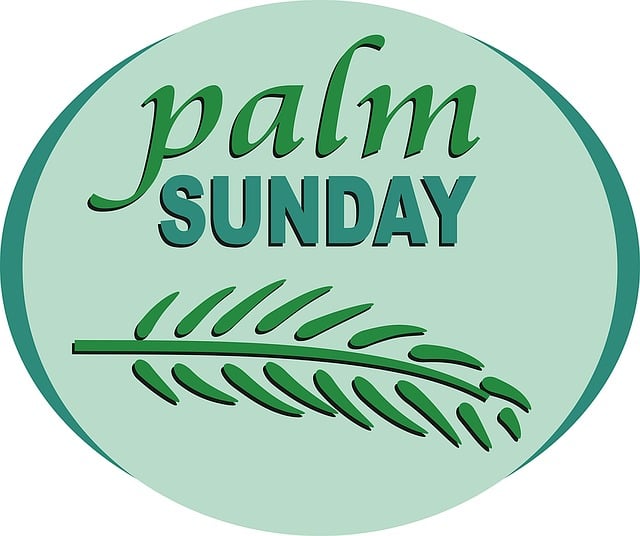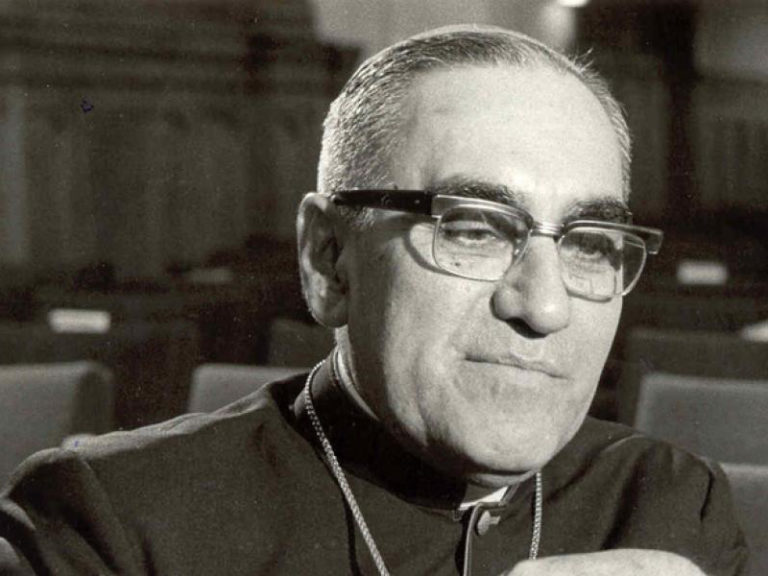 PALM SUNDAY - 'REMEMBERING BISHOP OSCAR ROMERO'
PALM SUNDAY - 'REMEMBERING BISHOP OSCAR ROMERO'
Some will have heard me before speak about Archbishop Oscar Romero, from El Salvador, that small country the size of Wales, in Central America. He is one of the 12 saints remembered in stone statues on the front of Westminster Abbey, along with Martin Luther King, Grand Duchess Elizabeth from Russia and Maximilian Kolbe from Poland, who gave his life in place of another prisoner in Auschwitz. Archbishop Romero gave his life in trying to end the oppression of the poor of El Salvador, which was run by just 13 families who controlled even the army. Palm Sunday for Romero was when he preached a sermon telling the soldiers to stop killing the poor. Like Jesus he was murdered for his challenge to the authorities, on this day March 24th, 44 years ago.In 2010, the United Nations General Assembly proclaimed 24 March as the "International Day for the Right to the Truth Concerning Gross Human Rights Violations and for the Dignity of Victims" in recognition of Romero's role in commitment to human rights. He was a follower of Christ in a way that fortunately for the rest of us Christians, very few of us are called to emulate.But he, like the others on Westminster Abbey frontage, are an inspiration to us all and we remember them with thanksgiving.
When he came in sight of the city Jesus wept over it, if only you had known the way to peace – in Hebrew ‘Shalom’, or in Aramaic ‘Shlama’, like our ‘Shhhh’.. ‘Shlama’, such an evocative word. Shalom of course means more than just ‘peace’ in the sense of personal quietness of mind, or an absence of conflict, it is much more positive than that. It means a societal peace, peace with prosperity for all, including hospitality… all will receive according to their needs. Including sanctuary if they require it….’
Jesus wept. And he wept with sadness, and pain, and anger, because he may not have lived many years but he knew there was enough, shelter and food for all, but humanity was failing to share it. God’s own people were failing to follow God’s law, God’s direction, and at the heart of this system of inequality and corruption was the Temple. Yes, King Herod was oppressing and taxing the people, and the Romans were oppressing and taxing the people, but the Temple, the place above all where God’s kingdom should be in place, housed the tables of the money changers and the sellers of doves and lambs for sacrifice, cheating the people for their own aggrandisement, to fund their comfortable lifestyle. And any who pointed that out were going to suffer.
It was this kind of systemic corruption and oppression that got to Oscar Romero as he came to terms with what was really going on in the society around him, and what he was supposed to accept, even to bless. Thirteen families controlled El Salvador – business, the parliament, the media, the army, everything, and woe betide anyone who tried to turn over their tables. And when Archbishop Romero stood up to them, he – as he must have known – as Jesus must have known as he turned over those tables – he was signing his own death warrant. And 24 hours later he was murdered as he celebrated Communion at the Table of the Lord.
Not all of us are called to be an Oscar Romero, or – of course - a Jesus Christ, But we are called to continually try to represent what they stand for, and encourage our fellow human beings to live up to their calling as children of God. Currently our society is being polarised, deliberately, to demonise migrants and refugees, because there are those in the corridors of power who think they can create enough fear in the population to maintain their hegemony. They have created a narrative of the ‘hostile environment’. However the Church has an alternative narrative to offer, hospitality and sanctuary, and we need to communicate that far and wide.
This not a new struggle however. As some will knowsanctuary, safety and security, was originally a Biblical concept, the six ’cities of sanctuary’ so designated in the Book of Joshua. This, in a time of blood feuds and revenge killings, was to allow a sacred space for an exploration of a serious incident, and to examine possible outcomes. The idea was picked up in mediaeval England and you can still see the sanctuary knocker on the door of Durham Cathedral. Even Holy Trinity Stratford had one. In more recent times a sanctuary movement developed in the southern United States, Arizonain particular, when the police began picking up migrant people who had been living and working there, for years in some cases, with families to boot, and deporting them to Mexico whether they came from there or not… Churches in Arizona began taking in individuals, even families, while they could state their case to the authorities, for being self-sufficient and contributing to the local economy.Many of them ultimately were able to remain.
This movement came to the UK in the late seventies, when the authorities here began to arrest individuals and families who had arrived as students or on other limited visas, often from Commonwealth Africa or Asia. Then for one reason or another, sometimes through fear of returning home, sometimes through getting good jobs and contributing to our economy, sometimes through falling in love with the wrong person, marrying and starting a family, they had over-stayed.Some of them were linked with churches, even as quite long-time members, and when they were told they were to be deported the churches said ‘Hold on here, is this fair, is it justified, can we take a fresh look?’ And it did create an atmosphere of anxiety, like that created by Jesus’s actions in the Temple in Jerusalem. But almost always a fresh look was taken, and they were given permission to stay.
It was sacrificial by those churches; single people lived in churches for months, in some cases families, and for even longer. The Ogunwobi family whose parents had met and married here in the UK, and had three children, lived inHackney DownsBaptist church for over two years in the end, with the children going to school and the mum going shopping, but dad staying ‘home’. Eventually they were given the right to remain, and dad went on to become a Borough Councillor, among other things. A particular story concerned the Ozigi family, from Nigeria, James and Elizabeth same as students, then met here, married, had three children, were working and self-supporting and James was becoming a pastor in the Cherubim and Seraphim Church. However they were found to be overstaying their original visas and one day police and immigration came to their house, when James was there with the children and a distant family friend, and promptly arrested James and took him away, leaving the children in charge of someonethey didn’t really know – a clear safeguarding offence - and told them to tell theirmother to bring them to the police station when she got back.
I was working for the Council of Churches at the time and Elizabeth knew to call me as she feared (rightly) they would be immediately deported. I invited her to my home and then rang the immigration service to say this may be technically legal but it was both unjust and inhuman.I then had a senior officer ring me back and ask if I was ‘harbouring these people’, a question I chose not to answer. James was deported to Nigeria the following day, whereupon began a vigorous campaign to reunite the family. Eventually we were successful, James was brought back, and I actually had an apology from the Home Office, the only one I can remember. James became a full pastor in his church, his congregation met in an under-used Anglican church in south London and teamed up with the congregation there, later he came to work for the Council of Churches as my colleague, and he and Elizabeth brought up three fine young people all making their contribution to British society. There were at least 20 cases of sanctuaries, also in mosques and a Hindu Temple, and all except one were successful.But these were what we call ‘extreme sanctuary’ cases and we trust will not be needed again.
This movement has now re-emerged as the Cities of Sanctuary movement, initiated by Revd Inderjit Bhogal who came here to preach about it several years ago, and now includes cities, towns, communities, schools, universities, libraries and of course churches of sanctuary. Sanctuary is a statement of solidarity with those seeking safety. It is a counter-narrative to that shameful Government narrative of a ‘hostile environment’, while Ministers still go on claiming we have a wonderful record of welcoming those escaping persecution.
And inhuman deportations don’t need to happen, if there is enough good sense and humanity in the responsible authorities, and resistance in the community. And it isn’t happening at present, although with the threatened forcible removals to Rwanda it has reared its head. And we might need to ask what would have happened if one of our refugee members here, before winning the right to remain, had been told they were being deported, either back into danger where they had fled from, or to Rwanda? We would have had tough decisions to make. We remain concerned about the Adenuga family. Hopefully it will never happen – and actual sanctuary is the extreme end of hospitality if you like, but quite small and ordinary churches like this one have risen to the challenge. One way to prevent such a challenge is to vigorously urge a more hospitable approach to those who do risk their lives to get here, and why would they do that if they thought it was better elsewhere. What a vote of confidence in the UK for people to travel hundreds, even thousands of miles to get here, because they thought we were a safe and secure and hospitable place to live.
As some know we are in discussion with Evesham Vale Welcomes Refugees to initiate Evesham as a Town of Sanctuary or a community of sanctuary, or maybe the Vale of sanctuary. We opened our Evesham Sanctuary Centre last Friday, the name given to the movement initiated by the Church, and we are inviting the National Co-ordinator of the Cities of Sanctuary movement to come and speak to us during Refugee Week in June, and inviting all those groups we feel would be interested, churches, schools, foodbanks who offer their own kind of sanctuary), community organisations, the Town Council, to come together and commit to Evesham Vale being a community of hospitality and sanctuary.
Reverend David Haslam
Evesham Methodist Church
Palm Sunday 2024
